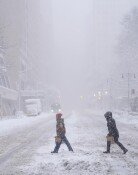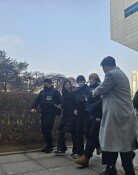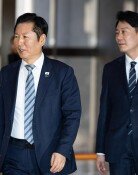[Editorial] Stronger Measures Needed to Protect Presidential Candidates from Terrorism
[Editorial] Stronger Measures Needed to Protect Presidential Candidates from Terrorism
Posted November. 15, 2007 03:58,
On November 13, a man in his 30s threw an egg at independent presidential candidate Lee Hoi-chang while Lee was campaigning in Seomun Market in Daegu. Lee took the incident lightly and said, I regard the behavior as an expression of love and hate toward me. Yet this was clearly an act of terror and should not be dealt with lightly. No one can be sure that another more serious incident could never happen. It is reminiscent of the shock after the box cutter attack on Grand National Party leader Park Geun-hye during local elections last year.
Terrorism is an act of evil against democracy and civilization, and should never be tolerated. For political purposes or just because of psychological problems, terror against presidential candidates during this campaign period is a possibility. The North Korean factor should not be ignored either. The administration, each political party, and their candidates need to prepare measures against possible acts of terrorism.
Candidates affiliated with parties are in a better position as they are given bodyguards by the police even before candidate registration, while independent candidates receive police protection only after registration. In any case, however, candidate protection is not enough. Apart from a lack of personnel for the job, the nature of campaigning means that it is not easy to guard candidates who are constantly exposed to the public. An excessive guard surrounding a candidate could also create a negative image to the voters. Measures to protect candidates should take this fact into account.
Measures are not adequately prepared to deal with contingencies where candidates die or are hurt in a terrorist attack. Current electoral law stipulates that if a candidate dies 5 days after the registration date, his or her party must run in the election without the candidate. That happened when opposition party candidates Shin Ik-hee and Cho Byeong-ok suddenly died during the third and fourth presidential elections.
There is no time to waste in changing this irrational election system for the upcoming election.
Last July, the National Assembly Political Relations Subcommittee agreed that if a candidate ranked first or second in public approval ratings dies, the election must be delayed for 30 days and a new candidate can be named. Yet the ruling party annulled this agreement without any solid justification. The measure must be discussed again to protect the nation from falling into chaos in the event of the unexpected.







